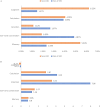Efficacy of computerized cognitive training using mobile devices to promote cognitive functioning in community-dwelling older adults with or without risk of mild cognitive impairment: A multi-centre longitudinal study
- PMID: 40808710
- PMCID: PMC12344341
- DOI: 10.1177/20552076251362117
Efficacy of computerized cognitive training using mobile devices to promote cognitive functioning in community-dwelling older adults with or without risk of mild cognitive impairment: A multi-centre longitudinal study
Abstract
Objective: To investigate the efficacy of a 5-month computerized cognitive training programme (CCT) "Exercise your Brain" using mobile devices in improving cognitive functioning in community-dwelling older adults with and without risk of mild cognitive impairment (MCI).
Methods: One hundred thirty-four older adults were recruited from 5-day activity centres for the older adults in Hong Kong using convenience sampling to participate in a 5-month CCT training. Participants were stratified into older adults with and without risk of MCI.
Results: There was significant improvement (p < 0.001) in MoCA 5-min for the whole sample after 5-month CCT (d = 0.72) and the effects were maintained at 3-month follow-up. The group at risk of MCI improved their cognitive functioning immediately after intervention more than the non-MCI group (p < 0.001, d = 1.37 vs d = 0.55). In the task-based performance, there was significant interaction effect between memory and calculation with and without risk of MCI when years of formal education was a covariate, and that the non-MCI group had the highest improvement in Judgement (6.23%) and memory (5.43%), compared with that (1.47% and 2.33%) in the group at risk of MCI. The risk-of-MCI group had the highest improvement in attention (2.67%) and eye-hand coordination (4.87%), compared with that of the healthy older adults.
Conclusion: Cognitive functioning in both older adults with or without risk of MCI was enhanced immediately after CCT using a mobile device and endured over a three-month follow-up. The training effect on the group at risk of MCI was significantly greater than that for the non-MCI group. With recent advances in mobile technology, remote cognitive training in terms of using mobile devices for older adults as primary and secondary preventions is applicable and practicable.
Keywords: Computerized cognitive training; mild cognitive impairment; mobile devices; older adults.
© The Author(s) 2025.
Figures



Similar articles
-
Falls prevention interventions for community-dwelling older adults: systematic review and meta-analysis of benefits, harms, and patient values and preferences.Syst Rev. 2024 Nov 26;13(1):289. doi: 10.1186/s13643-024-02681-3. Syst Rev. 2024. PMID: 39593159 Free PMC article.
-
Prescription of Controlled Substances: Benefits and Risks.2025 Jul 6. In: StatPearls [Internet]. Treasure Island (FL): StatPearls Publishing; 2025 Jan–. 2025 Jul 6. In: StatPearls [Internet]. Treasure Island (FL): StatPearls Publishing; 2025 Jan–. PMID: 30726003 Free Books & Documents.
-
Exercise for reducing fear of falling in older people living in the community.Cochrane Database Syst Rev. 2014 Nov 28;2014(11):CD009848. doi: 10.1002/14651858.CD009848.pub2. Cochrane Database Syst Rev. 2014. PMID: 25432016 Free PMC article.
-
Cognitive behavioural therapy (CBT) with and without exercise to reduce fear of falling in older people living in the community.Cochrane Database Syst Rev. 2023 Nov 15;11(11):CD014666. doi: 10.1002/14651858.CD014666.pub2. Cochrane Database Syst Rev. 2023. PMID: 37965937 Free PMC article.
-
Multi-domain interventions for the prevention of dementia and cognitive decline.Cochrane Database Syst Rev. 2021 Nov 8;11(11):CD013572. doi: 10.1002/14651858.CD013572.pub2. Cochrane Database Syst Rev. 2021. PMID: 34748207 Free PMC article.
References
-
- Petersen RC. Mild cognitive impairment as a diagnostic entity. J Intern Med 2004; 256: 183–194. - PubMed
-
- Alzheimer’s Association. Special report ‘More than normal aging: Understanding Mild Cognitive Impairment’. Chicago, IL: Alzheimer’s Association; 2022. Downloaded on 3 Feb 2025 at https://www.alz.org/getmedia/257803ff-0335-4882-a37b-c4acb77b1a66/alzhei...
LinkOut - more resources
Full Text Sources

